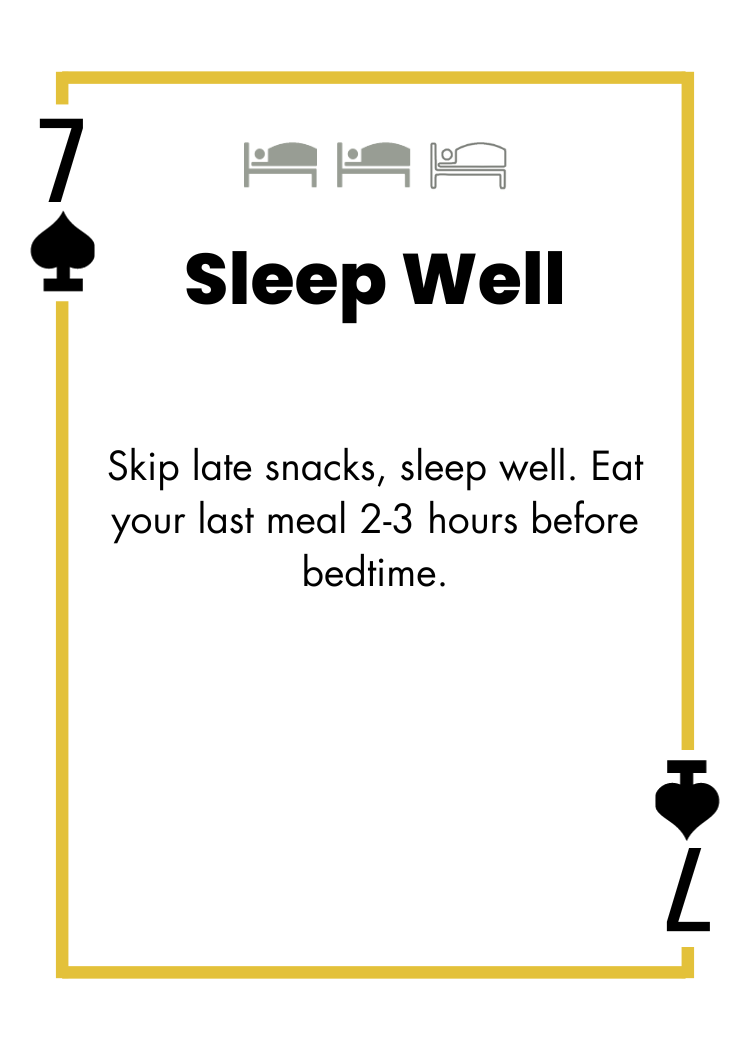7 of Spades - Skip Late Snacks

Nighttime eating is a risk factor for metabolic syndrome and obesity. They are both associated with cardiovascular diseases which may include cerebrovascular disease, ischemic heart disease, and type 2 diabetes (Yoshida et al., 2018).

Before making any major changes in your diet, ensure you first consult with a qualified Dietitian (your Imago coach!) or physician. This applies especially to individuals with diabetes or other cardiometabolic conditions.
Try to eat your last meal 2-3 hours before bedtime and avoid large mixed meals right before bed.
Eating late has been shown to result in higher blood glucose, insulin and cholesterol. Because our metabolism slows at night, we tend not to utilise energy from these meals as fat instead.
Eating late also increases the body’s heart rate, making it harder to fall asleep, triggering nighttime heartburn, and reducing the quality of your sleep.
Eating late is something to avoid and an easy 1% tip to put in place.
Many physiological processes display day/night (circadian) rhythms, including feeding behaviour, lipid and carbohydrate metabolism, body temperature, and sleep (Kelly et al., 2020).
A study by Yoshida et al. (2018) investigated if dinner immediately before bed, snacks post-dinner, or combinations of both were associated with metabolic syndrome and its parts in a large cohort of subjects in Japan. The authors found both habits of eating at night dinner immediately before bed and snacks post dinner are associated with a higher Body Mass Index (BMI) in both Japanese men and women.
Furthermore, men participating in both habits showed higher odds of increased lipids in the blood when compared to those with neither habit. Also, women with both habits had higher odds of developing metabolic syndrome and abdominal obesity when compared to those avoiding both habits. In men and women, both night eating habits were associated with increased lipids in the blood. The presence of both habits tended to show an increased additive influence on the development of obesity in women.
Therefore, the authors suggest individuals in middle age must be advised to abstain from both night eating habits to help reduce the risk of emergent complications associated with metabolic syndrome.
Kelly et al. (2020) performed a study where they monitored the metabolism of older subjects in a whole-room respiratory chamber over two distinct 56-hour sessions in a random crossover experimental design. In session one, 1 of the 3 daily meals was presented as breakfast but in session two a nutritionally equivalent meal was presented differently as a late evening snack. The length of the overnight fast was the same for both sessions. The authors found Respiratory Exchange Ratio (RER) differed between the two sessions. From their finding, the authors noted the daily timing of nutrient availability coupled with daily control of metabolism drives a switch in substrate preference such that the late-evening snack session (2) resulted in significantly lower (fat) lipid burning compared to the breakfast session (1). Therefore, the time meals are consumed during the day and night cycle affects how ingested food is burned or stored in humans. This finding suggests essential implications for optimal eating times.
Small changes CAN make a big difference – that’s what the 1% club is all about.
Kelly, K. P., McGuinness, O. P., Buchowski, M., Hughey, J. J., Chen, H., Powers, J., … & Johnson, C. H. (2020). Eating breakfast and avoiding late-evening snacking sustains lipid oxidation. PLoS biology, 18(2), e3000622.
Yoshida, J., Eguchi, E., Nagaoka, K., Ito, T., & Ogino, K. (2018). Association of night eating habits with metabolic syndrome and its components: a longitudinal study. BMC public health, 18, 1-12.


 See Other Cards!
See Other Cards!